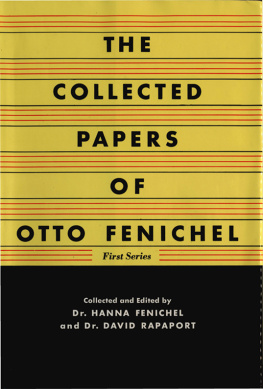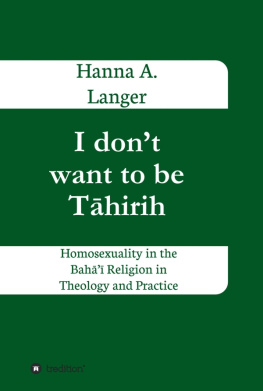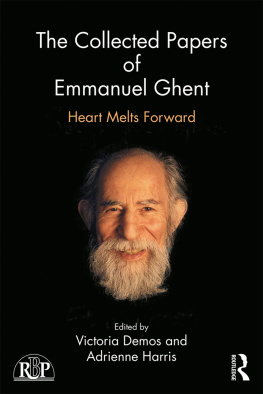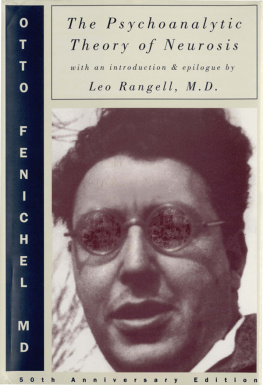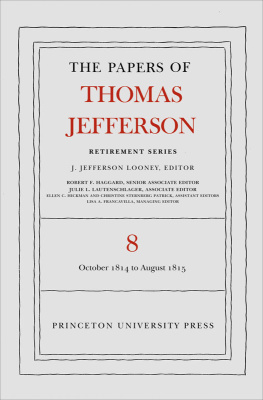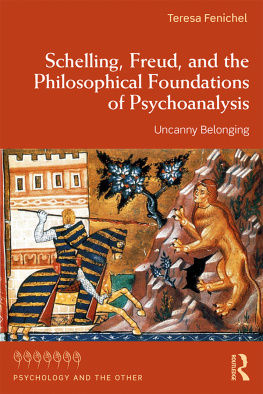Fenichel Hanna - The Collected Papers of Otto Fenichel
Here you can read online Fenichel Hanna - The Collected Papers of Otto Fenichel full text of the book (entire story) in english for free. Download pdf and epub, get meaning, cover and reviews about this ebook. City: New York, year: 1953;2014, publisher: W. W. Norton & Company, genre: Science. Description of the work, (preface) as well as reviews are available. Best literature library LitArk.com created for fans of good reading and offers a wide selection of genres:
Romance novel
Science fiction
Adventure
Detective
Science
History
Home and family
Prose
Art
Politics
Computer
Non-fiction
Religion
Business
Children
Humor
Choose a favorite category and find really read worthwhile books. Enjoy immersion in the world of imagination, feel the emotions of the characters or learn something new for yourself, make an fascinating discovery.
- Book:The Collected Papers of Otto Fenichel
- Author:
- Publisher:W. W. Norton & Company
- Genre:
- Year:1953;2014
- City:New York
- Rating:5 / 5
- Favourites:Add to favourites
- Your mark:
- 100
- 1
- 2
- 3
- 4
- 5
The Collected Papers of Otto Fenichel: summary, description and annotation
We offer to read an annotation, description, summary or preface (depends on what the author of the book "The Collected Papers of Otto Fenichel" wrote himself). If you haven't found the necessary information about the book — write in the comments, we will try to find it.
The Collected Papers of Otto Fenichel — read online for free the complete book (whole text) full work
Below is the text of the book, divided by pages. System saving the place of the last page read, allows you to conveniently read the book "The Collected Papers of Otto Fenichel" online for free, without having to search again every time where you left off. Put a bookmark, and you can go to the page where you finished reading at any time.
Font size:
Interval:
Bookmark:
The Collected Papers
OF
OTTO FENICHEL
FIRST SERIES
Books by Otto Fenichel
The Psychoanalytic Theory of Neurosis
The Collected Papers of Otto Fenichel: First Series
The Collected Papers of Otto Fenichel: Second Series

COPYRIGHT 1953 BY
W. W. NORTON & COMPANY, INC.
ISBN 978-0-393-24566-0 (e-book)
THE twenty-six years that closed with the death of Otto Fenichel in January, 1946, marked a very special time of development in the world of psychoanalysis. In its first half Freud was still productive, and his work was being eagerly studied, discussed, elaborated, and tested by the small groups of analysts who were gathered about the newly formed psychoanalytic institutes. These groups were foci of an intense psychoanalytic life, and as time has shown, potentially extraordinarily expansive. It is this period which Zilboorg has called the erudite period of psychoanalysis. Psychoanalysts followed an inner calling; their psychoanalytic life was dedicated to observation, study, and learning.
This same quarter-century is the period in which Otto Fenichel lived his professional life, and of all his contemporaries he was perhaps its best example and avatar. An eager and alert intellect, an indefatigable worker and student, an avid and incisive observer, digester, elaborator, and systematizer, Fenichel possessed the ideal ear and pen of his time. The present volume shows at a glance the extent of his capacity to observe, to think, and to shape his thoughts; but besides the essays here collected and besides the books which brought him fame, a constant and extraordinary number of reviews which appeared in the psychoanalytic journals attests to the breadth and depth of his reading and knowledge. These reviews were soon discovered by his colleagues to be of the highest value. Not only were they often clarifying where the author might be obscure; they also contained comments and judgments that in themselves were original contributions. We could all of us rely on Fenichel to point out what was new and sound in our colleagues thinking, and we were sure of a definite and mature opinion on its importance.
Fenichel had that rare integration of personality and activity which is indicated by the word sincerity. His interest in sociology, to give an example, was not pallidly abstract. Not at all: Fenichel played a real social role; he functioned in the group constantly, effectively, absorbing from it and giving back to it. No one was ever a better citizen. I recall one of the many committee meetings at which we both sat. Fenichel had some policy to advocate, which seemed important to him at the time. He put his all into this advocacy. With the passion and intellectual persuasion of a great lawyer, he argued, explained, reasoned, and rebutted; one would have thought that the defeat of his measure would leave him a malcontent and a rebel. On the contrary: after an unfavorable vote, there was Fenichel, smiling, joking, relaxed, entirely content that he had adequately stated his point, without any personal disappointment and without any thought that he would do other than follow honestly and conscientiously the decision of the majority. He was absolutely trustworthy, free of personal resentments and grudges, equally free of any partisanship that stemmed solely from friendship.
This same quality permeates his writings. Fenichel is solid to the core. Independent in his convictions, as a person and as a psychoanalytic journalist, he was a carrier and a bond. The same holds for his more permanent and systematic authorship, as the reader of the present book will easily see. There was nothing in the analytic atmosphere for which he did not serve as a condenser, no currents for which he did not serve as a medium; and nihil tetigit quod non ornavit.
I should not like to persist in mechanical metaphors in this sketch of Fenichels qualities and functions. More accurate would be the biological tropes of growth and production. The great storage and transmutation which Fenichels solid clinical experience and erudition represented came to fruit in significant and prodigious fashion, with a burgeoning and efflorescence that amazed us all. In the analytic world, it passed as self-evident that a textbook of psychoanalysis was impossible, even if this textbook covered only the field of the neuroses. Fenichel accomplished the impossibleand twice. His first textbook, in English called The Outline of Clinical Psychoanalysis, first published serially and then in book form, was an immediate success. All that psychoanalysis had said specifically about the special neuroses, skillfully digested, clarified by original comments, was presented in a convenient arrangement. In eleven chapters, the material was ordered according to the individual neuroses, an arrangement that is obviously somewhat arbitrary, which made necessary the omission of much related theory and much analytic material of related fields (for example, dream psychology), yet at the same time the book was incredibly complete in the fulfillment of its practical intention. For a decade it was read eagerly by students, in all senses of that word, to their great profit. Its effect was not limited to the narrower psychoanalytic world; it became standard reading for the larger world of psychology, psychiatry, and the mental and social sciences. It was shortly out of print, it became hard to buy, and there was a great and growing demand for its reissue.
Fenichels revision and rewriting, prolonged because of the war, produced a totally new book, even though the older Outline served as a point of departure. This was his justly famous large work, The Psychoanalytic Theory of Neurosis, the more remarkable of the two impossible accomplishments. This book, with its immense erudition, its textual profusion, and its vast bibliography, was not a mere exposition but, in the words of Hanns Sachss review, an encyclopedia of stupendous completeness, compared by the same reviewer to the great digests of law and jurisprudence, specifically to the most famous of them all, the Code of Justinian. Nor was the book merely monumental, a satisfying demonstration of brilliant scholarship, to be viewed with sterile admiration. Fenichel always functioned. The book proved consistently and intensely useful. It shortened and eased the work of everyone who has, since its appearance, engaged upon the study of a clinical psychoanalytic subject, or who has written a psychoanalytic paper. It is at once a work of reference for the advanced and a trustworthy guide for beginners. In fact, for a few years after its appearance, there was some danger that the uninitiate might mistake this book for all of psychoanalysis, an idea which its scholarly author would have been the first to combat.
With so much of Fenichels work available in these books (and there is also a monograph on psychoanalytic technique), it might be asked with reason why the present collection of individual essays should see the light. The answer is not hard to find. Fenichels books, for all their sinewy bulk, did no more than touch upon many subjects cultivated in these essays. Psychoanalysis is more than a theory of neurosis, however broadly this theory may be conceived, and Fenichel contributed to many other fields. Indeed, in the narrower clinical field itself, even Hanns Sachss review found one source of dissatisfaction. The only point in which the book gives less than complete satisfaction is the abbreviated rendering of case histories. The present collection in many ways corrects this omission. Many of Fenichels case histories deserve attention and study for themselves and not merely as part of a general exposition, where many niceties are lost in the generalizations. The readers attention is therefore called to some of the fine case reports in the individual articles; it is difficult to single out one more than another.
Font size:
Interval:
Bookmark:
Similar books «The Collected Papers of Otto Fenichel»
Look at similar books to The Collected Papers of Otto Fenichel. We have selected literature similar in name and meaning in the hope of providing readers with more options to find new, interesting, not yet read works.
Discussion, reviews of the book The Collected Papers of Otto Fenichel and just readers' own opinions. Leave your comments, write what you think about the work, its meaning or the main characters. Specify what exactly you liked and what you didn't like, and why you think so.

